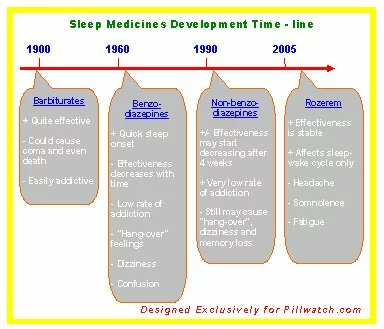
Nowadays pharmacists (people, who develop and manufacture medications) are faced with a double challenge. They have to create pills, which would combine maximum effectiveness in treating a disease and minimum side effects or negative impact on the human organism. To minimize the risk of adverse reactions is even more important when a medication may potentially cause something more serious than just nausea or diarrhea.
For many years people, suffering from insomnia or trouble sleeping, have been solving a dilemma: either to treat insomnia but put themselves at certain risk of experiencing side effects or not to use medications at all to fight the disease but get used to sleepless nights.
Since July 2005, there appeared one more option on the market of anti-insomnia medications. Ramelteon is offered under the brand name Rozerem and it is said to be the first prescription medication of its class, which works differently from all the other existing medications to treat insomnia.
In order to understand the actual difference between Rozerem and other available medications, let us compare the mode of action and side effects, which are adherent to Rozerem and other treatment options.
Since sleep process is governed by brains, all existing sleep medications (or hypnotics) target human brains in order to make people fall asleep. But here is a small problem - today's science succeeded in understanding brain activity approximately as well as in understanding the origin of Solar system (there are many hypothesis, but too little evidences). For example, we know that there are specific areas in human brains, responsible for certain vital functions (sleep, memory, feelings, mood etc.), but we know neither the exact borders of that areas nor the exact principles of their functioning.
Practically all prescription medications (I mean only benzodiazepines and non-benzodiazepines, which are commonly used today to treat insomnia) target several brain areas, which are believed to control sleep as well as other systems, such as memory and balance, for example. As a result, these medications may lead to specific side effects, like partial amnesia or drowsiness.
Rozerem works completely different. Its target is human master clock, which is responsible for normal sleep-wake cycle. This master clock is also located in brains, and it says the body when to go asleep and when it is time to wake up, taking into account the day and night cycles in nature.
It looks like scientists have found the exact location of this clock, therefore that Rozerem affects only this part of brain and does not influence memory or other brain centers. So, Rozerem differs from other sleep medications by working more precisely on the sleep mechanism in human brains, without affecting other systems.
Withdrawal symptoms and drug addiction may also be caused by hypnotics, especially when they are used in an improper way or for a long period of time. Unpleasant feelings, sometimes even muscle cramps, vomiting, sweating may appear, when a person stops sleep medicines suddenly after taking them for a long period of time. People (especially those with history of alcohol or other abuse), who use sleep medicines in access or use them for a long period of time, may become addicted.

Finally, I would like to present the timeline, describing the evolution of sleep medications. It is designed exclusively for Pillwatch.com visitors and I hope it will help understand the difference between different types of sleep medications better.
Nick

| Tip for you : Sign-in with Your OpenID and post faster, easier and with easy access to all your past posts. | |
|
Your Nick: |
















